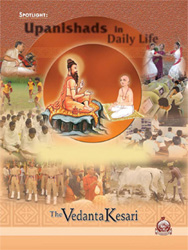Upanishads special
Entire issue of the Vedanta Kesari magazine of 12 December 2007 entitled "Upanishads in everyday life". A great, concentrated piece dedicated to the Upanishads.
Individual articles from various issues of the Vedanta Kesari magazine can also be found on this website. These are also translated in Greek, where the founder of this site is based.

-------------
Vedanta Kesari magazine of 12 December 2007
Though the Upanishads were revealed in a different age, their
power and influence is ageless and enduring. 'Time' cannot contain
or exhaust the perpetuity of the Upanishadic truths. Their
power and relevance, however, needs reaffirmation and restatement
to suit changed and the ever-changing circumstances. This is
what is conveyed in this issue's cover design. In the midst of
changed circumstances, represented by pictures of various human
activities, lie the eternal teachings of the ancient rishis, the discoverers
of the Upanishads. The design also tries to convey the fact
that Upanishads form the basis of Indian culture. The central message
of the Upanishads is conveyed through Swami Vivekananda's
words. More... ![]()
Sri Sarada Devi in the Light of the Upanishads 17/7/2011
‘Look, this Sarada is Saraswati herself. She has come down to the world to give knowledge. . . She is no ordinary woman.’ More... ![]()
Swami Dayatmananda - The Story of Prajapati and Its Meaning 10/6/2010
The Upanishads are called Vedanta. The purpose of the Upanishads is to teach man his real nature and the way to know it. A man is what his core is and the Upanishads say that man’s core is divine and knowledge of this core—Self—is the purpose of human life. More...
Upanishad in the Eyes of Swami Vivekananda 3/3/2010
In the Shvetàshvatara Upanishad you find the rishi giving the clarion call to all and sundry and says: O children of immortality and all the gods residing in the highest spheres, listen, I have known that Being who is as resplendent as the sun; knowing Him alone one can transcend miseries. More... ![]()
Peace Chant in Upanishads
All Upanishads begin with peace invocations called shanti patha. The Mundaka Upanishad, for instance, opens with two peace invocations. The significance is that, knowing full well that nothing happens in the world without the sanction of the Divine the Vedic rishis humbly seek guidance and blessings from the Divine so that their efforts may be fruitful. In all the Upanishads the first words invoke peace, not only for oneself but also for maintaining balance in the whole universe. More... ![]()

